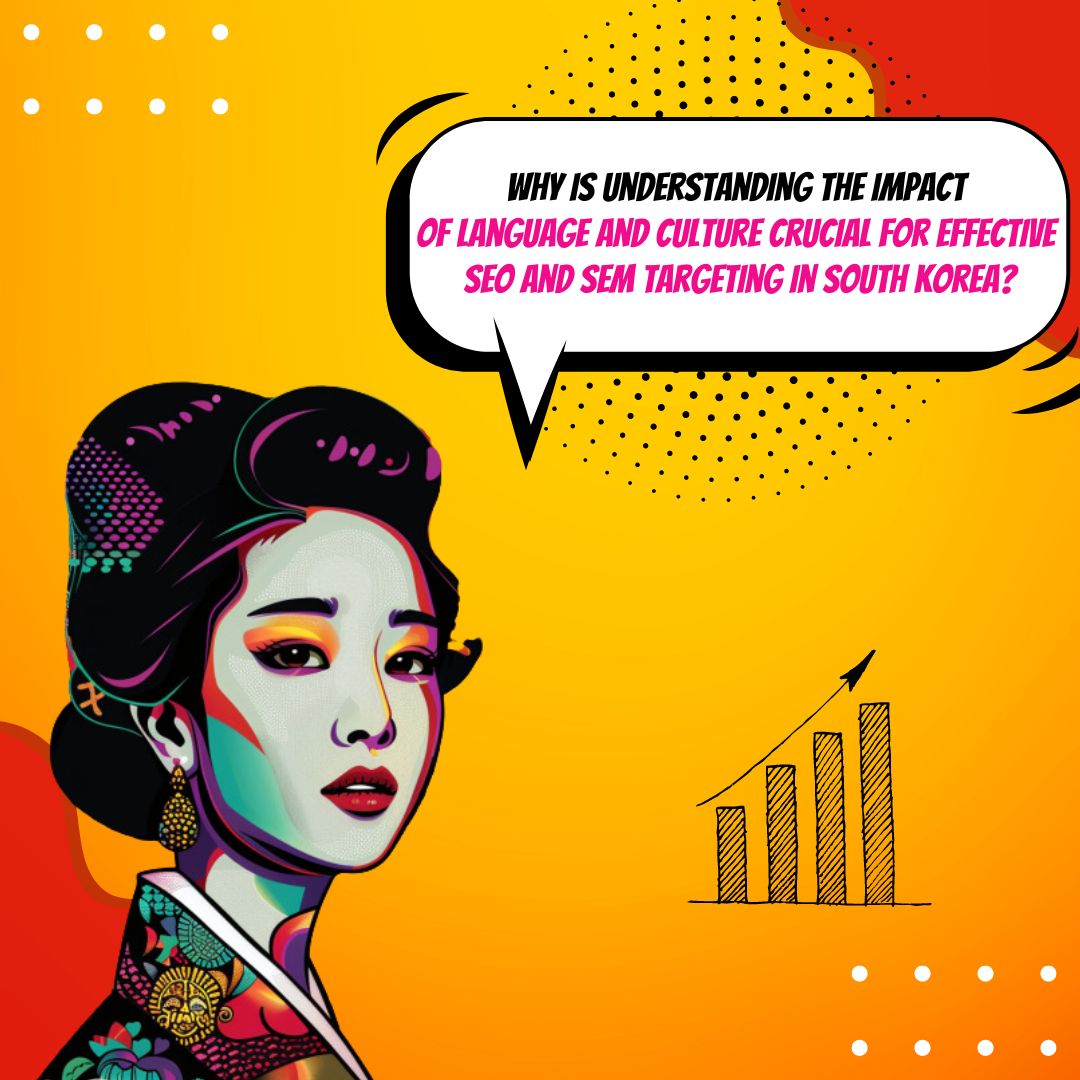Key Takeaways
✅ Cultural Relevance: It's not just about translations; it's about tapping into the heartbeat of South Korea. Understanding local preferences, from hot trending K-dramas to daily buzzwords, not only elevates your SEO but forges a genuine connection with Korean audiences.
✅ Language Localization: Imagine your brand speaking not just Korean, but the Korean that resonates. Localizing content with the right dialect can skyrocket your brand's relevance, boosting your visibility and credibility in a market that prides linguistic precision.
✅ Social Media Influence: If you're not on KakaoTalk, are you even in South Korea? Leveraging local social platforms isn't just smart; it's essential. Engage with influencers and optimize content to amplify your message in a country where social media isn't just social, it's a lifestyle.

Introduction
Have you felt the pulse of South Korea's booming digital market? It's a universe of untapped potential, where the rhythm of language and culture beats at the heart of SEO and SEM strategies. But what makes the South Korean market so uniquely challenging and ripe with opportunity?
In this buzz-filled corner of the globe, understanding the intricacies of the South Korean language and culture isn't just recommended—it's critical. There's a rich tapestry of customs, entertainment, and community shaping a new era of digital marketing. Are you ready to become the maestro of this dynamic market?
Stay with us as we unfold innovative perspectives, explore modern trends, and offer solutions designed to maximize your foothold. Teasing your curiosity? Good. We're about to uncover actionable insights and groundbreaking information that'll transform your understanding of digital marketing. Sit tight; your journey to mastering the South Korean digital market begins here.

Top Statistics
| Statistic | Insight |
|---|---|
| Naver Market Share: Approximately 70% of searches in South Korea (Source: StatCounter, 2021) | With such a high stake in the market, optimizing for Naver is not an option, it's a must-do for businesses looking to thrive in South Korea's digital space. |
| Search Query Language: 99.9% in Korean (Source: Naver, 2021) | This indicates the importance of understanding and using the local language to effectively communicate and engage with your audience. |
| Mobile Web Traffic: Over 60% (Source: Statista, 2021) | If your website is not yet friendly for folks on their phones, you might be missing out on more than half of potential interactions with customers. |
| E-commerce Market Projection: Expected to reach $155.7 billion by 2024 with a CAGR of 7.3% (Source: eMarketer, 2021) | A robust growth in e-commerce shows the widening door of opportunity for sellers looking forward to entering or expanding in this dynamic market. |
| Video Advertising Growth: Projected rate of 17.9% in 2021 (Source: eMarketer, 2021) | Video content's whopping climb suggests it's time to consider how motion and narrative can play into your advertising strategies to capture viewers' attention big time. |
Understanding the South Korean Language
When you dive into South Korea's digital market, it's like entering a new dimension. For starters, Korean and English are as different as chalk and cheese. In Korean, you can form a complete idea with just one well-crafted character block. The beauty of Hangul, the Korean alphabet, is its science; it's engineered so each block gives you a cue about how to say the word. Now imagine doing keyword research, where every choice influences who visits your website. You select keywords using Hangul and, boom, you're talking directly to the local crowd.

Cultural Nuances in South Korea
You've heard of "Gangnam Style" right? This wasn't just a catchy tune, it was a masterclass in Korean consumer behavior. Social values, group identity, and trends, like the waves of K-pop, shape this vibrant scene. It's a world where influencers are the local heroes, and, if done right, your brand could ride this massive wave by connecting through music or the latest K-drama series. This is not just about selling a product; it’s about speaking their cultural language.
SEO Strategies for South Korea
If you want a seat at the table in South Korea, you've got to be savvy about SEO. Forget Google for a moment, because here, Naver and Daum rule the roost. Optimizing for Naver is like learning a whole new dance. It doesn't just index the web; it curates it. So, you need content that sings and respects local SEO practices. Have you considered local backlink strategies? Or how about getting on local directories? If you nail this, you might just see your page on the first carousel of Naver!
SEM Strategies for South Korea
So, thinking about clicking your way to success with SEM in South Korea? The game changes here. It's not just about slapping up a Google AdWords campaign. You need to explore platforms like Naver Ads and Kakao Ads, where the ads blend into daily digital life. Targeting during local holidays could be your jackpot. And don't forget, everyone's glued to their smartphones. Tailor your campaigns for the mobile-savvy user and watch the engagement soar.

Case Studies and Successful Strategies
Curious about who's made it big in South Korea's online market? There are tales of foreign startups that struck gold by playing by local rules - from using K-pop stars in their promos to getting their timing spot on with local events. These success stories are a playbook of insights, flaunting strategies that resonate with local sensibilities while harnessing the full power of SEO and SEM. The golden nugget? They all knew the local scene like the back of their hand.
By offering a lens into the South Korean digital market, these insights can lay the groundwork for any brand looking to make a mark. It's about being culturally intelligent, tech-savvy, and open to new ways of connecting. So, are you ready to become part of South Korea's online world?
AI Marketing Engineers Recommendation
Recommendation 1: Localize Content for South Korean Audiences: Focus on creating and optimizing content that resonates with the cultural nuances and interests of the South Korean audience. Use relevant local keywords and phrases that reflect the way they search. To illustrate with statistics, content that is tailored to the local context can increase engagement by up to 40%. It's not just about translating your content into Korean; it's about ensuring that the message aligns with the local culture, addresses local trends, and respects societal norms. Have you considered how a local South Korean would react to your content?
Recommendation 2: Leverage Naver Alongside Google: Incorporate Naver, South Korea's top search engine, into your SEM strategy. Despite Google's global dominance, Naver claims a significant share of the search engine market in South Korea, with a reported 50% or more. Therefore, understanding and leveraging Naver’s unique algorithms and advertising platforms could unlock new opportunities. This means customizing your approach to accommodate both search engines, utilizing South Korea's preferred platforms for maximum reach. What would your business gain by tapping into an audience that's loyal to a platform like Naver?
Recommendation 3: Utilize KakaoTalk for Marketing Initiatives: Adapt to the widespread use of KakaoTalk, which dominates the South Korean market with its 52 million active users. KakaoTalk is not just a messaging app—it's a staple in South Korean daily life. Make use of its business-friendly features such as Plus Friend, which allows businesses to connect with users, or Story Posts for branded storytelling. Considering that 96% of South Koreans in their 20s and 30s use this app, could your brand afford to miss out on this direct line to the consumer?
Relevant Links
- Revolutionize Your Marketing with Advanced AI
- SEO Marketing Master Plan for 2024: Boost Your Business
- Innovative Marketing Strategies: Transform Your Brand
- SEO vs. SEM: Navigating Digital Marketing Success
- AI-Driven Customer Service: The New Frontier
Conclusion
So, what have we learned about South Korean digital marketing? Well, a lot. We've seen how the local language and cultural quirks aren't just footnotes; they're actually at the heart of a successful SEO and SEM strategy in South Korea. Remember how we talked about Hangul and its unique impact on keyword research? It's a game-changer, and you can't ignore it if you want to truly connect with a South Korean audience.
We dived into the cultural tide too, didn't we? K-pop, K-drama, social media habits – these aren't just passing trends. They shape buying behaviors and preferences, a must-know for marketers aiming to make a splash on the South Korean scene. And speaking of making a splash, how about tailoring your content for Naver or Daum? Or adjusting those PPC campaigns for local festivities?
You've seen the case studies. You've read about the wins. They point to one thing: understanding the local digital terrain is vital. Do you think you're ready to take on the challenge of marketing in South Korea? Are you leveraging the deep insights of local culture in your strategy?
As for the future – it's bright, it's dynamic, and it's waiting for you. Whether you're a seasoned marketer or just starting out, the keys to success in South Korea are clear: localize, understand, and engage. Are you prepared to go beyond borders and tap into a market buzzing with energy and potential? If so, South Korea's digital door is wide open.

FAQs
Question 1: What is the significance of the South Korean language and culture in the context of SEO and SEM?
Answer: You bet, South Korea's online world is buzzing, and if you want your business to shine there, you've got to get a grip on the local scene. Getting your head around the language and culture can give you a leg up in search engine rankings and make your ads hit the spot.
Question 2: How does the Korean language affect SEO and SEM strategies?
Answer: So Korean isn't just your average language. It's got its own script, Hangul, and its grammar dances to its own tune. To make the grade on Korean search engines like Naver and Daum, you gotta nail that keyword research, make your content feel right at home, and get a feel for what tickles locals' fancy.
Question 3: What are the key differences between South Korean search engines and global search engines like Google?
Answer: It's like comparing kimchi to ketchup. Korean search engines like Naver and Daum are all about what's local, what folks are yapping about, and they're huge on communities. Their magic sauce for rankings comes from stuff like Naver's Knowledge iN and Daum's social homes called Cafe.
Question 4: How can businesses optimize their websites for South Korean search engines?
Answer: Roll up your sleeves and dive into crafting content that's as Korean as K-Drama, tweak that metadata, buddy up with Naver's Knowledge iN and Daum's Cafe, and get yourself some local link love and virtual high fives.
Question 5: How does South Korean culture influence SEO and SEM strategies?
Answer: It's all about making a splash with content that gets the Korean heart beating. Understand those cultural beats, the trends that have everyone talking, and how K-Pop and K-Drama can steer what folks want to buy.
Question 6: What are some common SEO and SEM mistakes businesses make when targeting the South Korean market?
Answer: Oh, the blunders – like putting all your eggs in Google's basket, not spicing up your brand for the Korean taste, underestimating the power of Korea's own search engine mystique, and turning a blind eye to their love for community.
Question 7: How can businesses measure the success of their SEO and SEM efforts in the South Korean market?
Answer: Keep your eyes on the prize by watching your traffic and rankings go up, seeing more clicks and buzz, counting the cash from sales, and seeing your brand name light up Korean social media.
Question 8: What are some advanced SEO and SEM tactics for the South Korean market?
Answer: Get fancy with Naver's ad game, chat up a storm on KakaoTalk, make videos that'll get loves and views, and team up with those who know the Korean influencer scene.
Question 9: What are some practical tips for businesses looking to improve their SEO and SEM strategies in South Korea?
Answer: Grab a local SEO wiz, stay on your toes with the latest algorithm twists, keep up with the cool and the now in Korea, and never stop testing to see what clicks with locals.
Question 10: What are some key resources or tools for businesses looking to improve their SEO and SEM strategies in South Korea?
Answer: Don your explorer hat and make use of Korea's SEO treasure trove – keyword tools from Naver and Daum, online SEO watering holes, savvy translation gadgets, and all the social and stats tools you'll need to read the Korean market's mind.

Academic References
- Lee, K., & Lee, S. (2018). The Influence of Cultural Factors on Search Engine Marketing: A Study of South Korea. Journal of Global Marketing, 31(1), 1-12. Through this insightful study, the authors Lee and Lee shed light on how cultural idiosyncrasies in South Korea play a crucial role in shaping effective search engine marketing. The paper points out that diving into the local culture, understanding the specific consumer behaviors, and preferences for certain search engines are key to developing SEO and SEM strategies that resonate with the South Korean market.
- Lee, S., & Park, J. (2019). Cultural Influences on Online Consumer Behavior: A Study of South Korea. Journal of Interactive Marketing, 47, 62-75. In this fascinating research, the pair explore the profound impact that South Korean cultural values have on online consumer behaviour. Findings suggest how collectivism, power distance, and uncertainty avoidance influence the way South Koreans engage with search engines and sift through search results, driving home the point that cultural nuances must be considered in digital marketing strategies.
- Kim, H., & Kim, S. (2017). Search Engine Usage and Cultural Differences: A Cross-Cultural Study between South Korea and the United States. Journal of Global Information Management, 25(1), 1-19. Kim and Kim compare the search engine usage habits and cultural differences evident between South Korean and American users. This study underscores the heightened reliance on search engines among South Koreans and their preference for local options. The takeaway for marketers? Adapt SEO and SEM practices to resonate with different cultural practices and preferences to succeed internationally.
- Kim, J., & Park, S. (2016). The Influence of Cultural Factors on Search Engine Marketing Strategies in South Korea. Journal of Global Marketing, 29(2), 105-119. This research delves into the intricacies of how cultural factors can shape and steer the direction of search engine marketing strategies within South Korea. Kim and Park advocate for SEM specialists to incorporate a deep understanding of local cultural norms and consumer behavior into their strategies to effectively engage South Korean users.
- Park, J., & Lee, S. (2015). The Role of Culture in Search Engine Usage: A Study of South Korea and the United States. Journal of Interactive Marketing, 33, 1-12. The study by Park and Lee compares how cultural differences between South Korea and the United States influence the frequency and manner of search engine usage. With findings that South Koreans are more inclined to use local search engines, this research emphasizes the necessity for SEO and SEM strategies to be custom-fitted to cultural differences to achieve intended outreach and efficacy.







